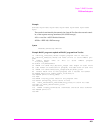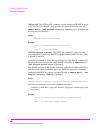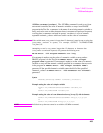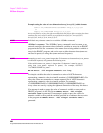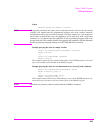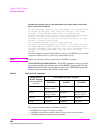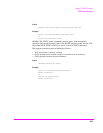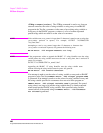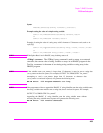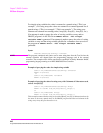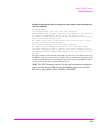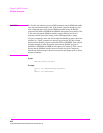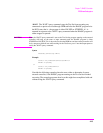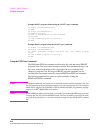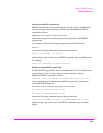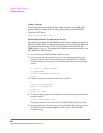
409
Chapter 7, IBASIC Controller
PROGram Subsystem
Syntax
PROGram[:SELected]:STRing <varname>{,<svalues>}
Example setting the value of a simple string variable
OUTPUT 714;"PROGram:SELected:STRing Variable,’data’"
or
OUTPUT 714;"PROG:STR Variable,’data’"
Example of setting the value of a string array with 3 elements of 5 characters each, such as Ar-
ray$(2)[5]
OUTPUT 714;"PROGram:SELected:STRing Array,’12345’,’12345’,’12345’
"
or
OUTPUT 714;"PROG:STR Array,’12345’,’12345’,’12345’"
NOTE: With Option Base 0 set in IBASIC, array indexing starts at 0.
:STRing? <varname>
The :STRing? query command is used to return, to an external
controller, the current value of string variables or arrays in an IBASIC program in the
Test Set. <varname> is the name of an existing string variable or string array in the
IBASIC program.
NOTE: If the variable name <var_name> is longer than 12 characters it must be sent as string data
(<var_name> enclosed in quotes). For example, OUTPUT 714;"PROG:STR? ’Var_name’".
Attempting to send a <var_name> longer than 12 characters as character data
(<var_name> not enclosed in quotes) will generate the following error:
HP-IB Error: -112 Program mnemonic too long
NOTE: If the programmer wishes to append the IBASIC ‘$’ string identifier onto the string variable name,
the string variable name must be sent as string data, that is enclosed in quotes. For example,
OUTPUT 714;"PROG:STR? 'Var_name$'"
Appending the IBASIC ‘$’ string identifier onto the string variable name without
enclosing the string variable name in quotes will generate the following error:
HP-IB Error: -101 Invalid character.



